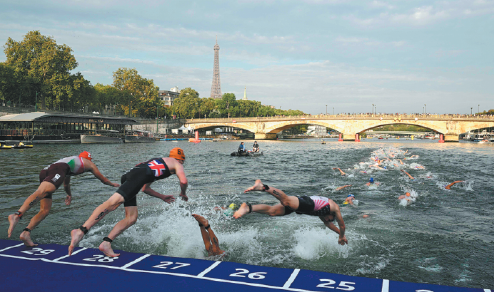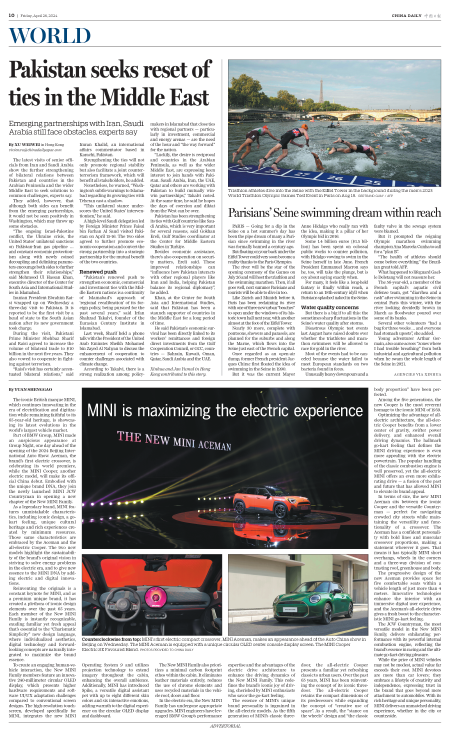
Triathlon athletes dive into the Seine with the Eiffel Tower in the background during the men's 2023 World Triathlon Olympic Games Test Event in Paris on Aug 18.
PARIS — Going for a dip in the Seine on a hot summer's day has been the pipe dream of many a Parisian since swimming in the river was formally banned a century ago.
But floating on your back under the Eiffel Tower could very soon become a reality thanks to the Paris Olympics.
The river will be the star of the opening ceremony of the Games on July 26 and will host the triathlon and the swimming marathon. Then, if all goes well, next summer Parisians and tourists will be able to dive in too.
Like Zurich and Munich before it, Paris has been reclaiming its river with one of three new urban "beaches "to open under the windows of its historic town hall next year, with another almost at the foot of the Eiffel Tower.
Nearly 30 more, complete with pontoons, showers and parasols, are planned for the suburbs and along the Marne, which flows into the Seine just east of the French capital.
Once regarded as an open-air dump, former French president Jacques Chirac first floated the idea of swimming in the Seine in 1990.
But it was the current Mayor Anne Hidalgo who really ran with the idea, making it a pillar of her Olympic bid in 2016.
Some 1.4 billion euros ($1.5 billion) has been spent on colossal public works to counter pollution, with Hidalgo vowing to swim in the Seine herself in late June. French President Emmanuel Macron says he, too, will take the plunge, but is coy about saying exactly when.
For many, it feels like a long-held fantasy is finally within reach, a return to an 18th-century idyll when Parisians splashed naked in the Seine.
Water quality concerns
But there is a big if to all this: the sometimes sharp fluctuations in the Seine's water quality after storms.
Disastrous Olympic test events last August have raised doubts over whether the triathletes and marathon swimmers will be allowed to race for gold in the river.
Most of the events had to be canceled because the water failed to meet European standards on two bacteria found in feces.
Unusually heavy downpours and a faulty valve in the sewage system were blamed.
But it prompted the reigning Olympic marathon swimming champion Ana Marcela Cunha to call for a "plan B".
"The health of athletes should come before everything," the Brazilian great told AFP.
What happened to lifeguard Gaelle Deletang will not reassure her.
The 56-year-old, a member of the French capital's aquatic civil defense team, got "diarrhea and a rash" after swimming in the Seine in central Paris this winter, with the river looking decidedly brown in March as floodwater poured over some of its banks.
Several other volunteers "had a bug for three weeks… and everyone had stomach upsets", she added.
Young adventurer Arthur Germain, also came across "zones where I had trouble breathing" from both industrial and agricultural pollution when he swam the whole length of the Seine in 2021.

